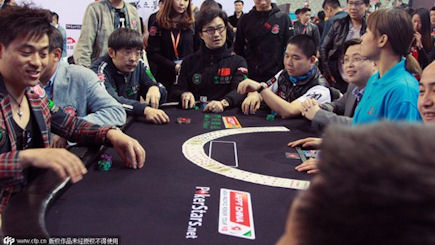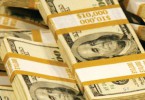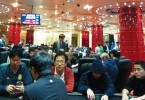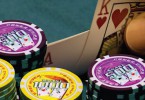The fallout from last Friday’s raid of the APPT Nanjing Millions by Chinese National Police has dramatically escalated with China’s state television broadcaster CCTV among a number of media channels to broadcast the news to the nation.
It has emerged that concerned local citizens tipped off police as to the gambling nature of the event, which involved approximately 2,300 entries at RMB 3,000 each, amassing an estimated total prize pool of around RMB 7 million (US$1,129,000). Given Pokerstars’ standard profit margin of around 13 percent, the gross gaming revenue for event organisers was estimated at approximately RMB 900,000 (US$145,000).
Any hopes Pokerstars or anyone else involved with the tournament had that the situation would slip quietly away have now been well and truly destroyed with as many as one billion Chinese having been told a “criminal event” had taken place. Local Chinese media has reported that Chinese celebrities were involved in the scandal, including Wang Feng (fiancé of Chinese actress and star of Crouching Tiger, Hidden Dragon, Zhang Ziyi), 2008 Olympic shooting gold medalist Qiu Jian and 2004 Olympic table tennis gold medalist Chen Qi.

Chinese musician Wang Feng took part in a charity event at the APPT Nanjing Millions in the lead-up to the main event. Courtesy: CFP
PokerStars immediately tried to distance itself from any “official” involvement with the tournament, providing the following statement to WGM:
After three very successful days of tournament poker, the organizers of the Nanjing Millions decided to postpone the event in order to address questions from local authorities. The tournament was sanctioned by the local government through the Jiangsu Provincial Chess Sports Association and held at the Jiangsu Wutaishan Sports Centre, an official Olympic venue. The event itself was organized and operated by a local poker operator, Star Poker Club, and sponsored by APPT China.
We are in contact with Star Poker Club and are seeking additional details. The organizers have issued a statement apologizing for the inconvenience and plan to resume the tournament in the near future.
For PokerStars to claim they were not the organizers of the event is disingenuous. At the time of writing, the event remains on the PokerStars APPT website at www.appt.com/tournaments/nanjing (although it may be taken down by the time you read this) and the pictures above and below show poker table layouts proudly displaying both PokerStars and APPT logos on them. The event was referred to as the APPT Nanjing Millions in all promotional material and heavily promoted on social media. APPT is a brand name owned by PokerStars. The APPT Nanjing Millions was being run on an almost identical operational basis to any tournament Pokerstars runs at their permanent Macau home at Melco-Crown’s City of Dreams or any other casino around the world.
We have been hearing a rumor that PokerStars will refund all players their RMB 3,000 entry fee, which equates to around RMB 7 million (US$1,129,000) in total. Why would PokerStars’ offer this if they were not the organizers of the event?

Courtesy: CFP
Back in March, this is what Pokerstars had to say in a press release sent to WGM announcing the APPT Nanjing Millions:
The growth of poker in China has been tremendous and we are committed to support this sport throughout the region,” said APPT President Danny McDonagh. “Nanjing is a key location that allows players from all over the country to participate. The previous two Beijing events last year were very successful and we are proud to be a part of this government-supported event.”
The press release, which identified Pokerstars as an Amaya Inc. company, went on to say that the APPT is owned by Amaya Inc. (TSX: AYA).
Pokerstars’ claim that the Jiangsu Provincial Chess Sports Association sanctioned the event has seemingly been made worthless by Guo Yujun, Director of the Chess Sports Management Center, a division of the State General Sports Administration. Guo confirmed that the Center had never held or approved any Texas Hold’em events of any form, be they live or online, had never recognized it in the national sports program and, most importantly, that in 2012 the Ministry of Public Security had placed Texas Hold’em on the list of crimes.
As for Pokerstars’ statement that the event had been merely “postponed” and there were plans to resume it in the near future – we find that very hard to believe now that CCTV has broadcast to the nation that this event was criminal gambling.
PokerStars has refused to divulge any information whatsoever as to the current situation, including the location or safety of staff members, despite repeated requests from WGM, although APPT President Danny McDonagh, who was present at the Wutaishan Sports Center when it was raided last week, has been in contact with us via email. McDonagh also refused to divulge any specifics but is believed to still be in China and in consultation with local lawyers.
The fate of local organizers, Star Poker Club, is much clearer with the Xinhua News Agency – the official press agency of the People’s Republic of China – reporting that they were “currently under police control … for alleged gambling and criminal activity.”
The Chinese media has been far from kind in its reporting of the APPT Nanjing Millions with CCTV13 (news channel) and CCTV4 (international channel) as well as satellite television station IFENG and a number of online news sites confirming this was a criminal case.
One of the CCTV reports showed the audience a map of where the APPT was holding events in 2015 and questioned why the APPT Nanjing Millions was being held in a sport stadium when every other event was held in a casino. Their inference was that, given any event which makes a profit of more than RMB 5,000 shall be considered illegal gambling, the APPT Nanjing Millions was very much a criminal event.
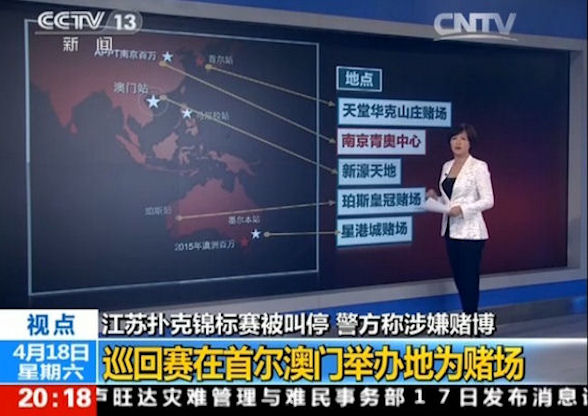
CCTV 13 news channel shows audiences where other APPT events are located – pointing out that the APPT Nanjing Millions is the only one not held in a casino
The fact that the tournament also featured unlimited rebuys has also come under scrutiny with police pointing to this as a key part of their evidence. A number of players have confirmed the rebuy structure, which has added to its perception as a gambling event.
So what exactly is the law in China when it comes to gambling? A 1997 Chinese Criminal Law identified three primary identifiers for action – opening a gambling house, gathering a crowd of more than 20 people for gambling and making a living from gambling. Opening a gambling house can see offenders sentenced to anything from public surveillance to criminal detention to jail for up to three years. In serious cases the jail sentence can be increased to three to ten years. Gathering a crowd and making a living from gambling are also subject to public surveillance, criminal detention or up to three years jail.
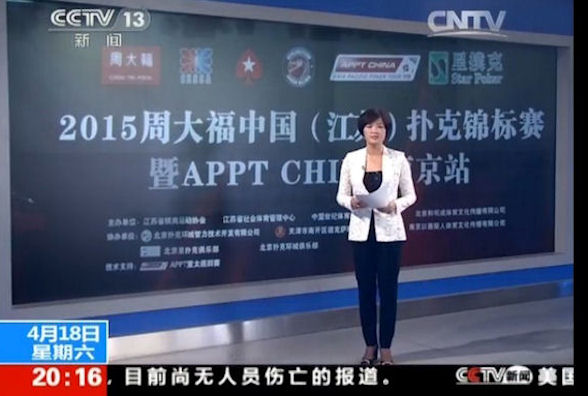
CCTV 13 presents a list of the tournament’s organizers, co-organizers and sponsors
The exact status of poker tournaments under these laws has been considered by some to be a gray area with both the APPT with its record-breaking Beijing Millions and the WPT with its WPT National China having both successfully run tournaments over the past few years. In both cases this was done with the approval of local authorities, but as we have since learned this means nothing if not officially recognized by the State General Sports Administration in Beijing.
The APPT and WPT will no doubt both claim that local partners misled them regarding the legality of their respective tournaments. However, other tours and organizations have also had the opportunity to hold events in China and opted against doing so after recognizing the dangers. We know this because our parent company World Gaming Group (through its gaming operations arm World Players Entertainment) was one of them. WGG was offered a poker tournament in Beijing earlier this year but declined when promised Central Chinese Government approvals could not be produced.
The Asian Poker Tour also cancelled its scheduled event in Guangzhou last year for the same reasons. Despite having obtained local clearances, the APT specifically asked their local partners to provide paperwork from provincial and national governments and when these couldn’t be provided they walked away.
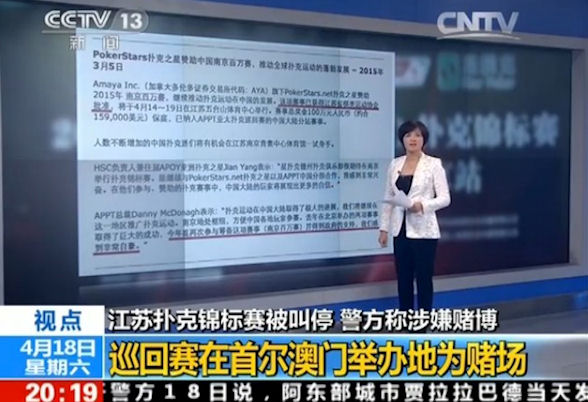
CCTV 13 shows a press release from PokerStars about the 2015 APPT Nanjing Millions
Why would PokerStars take such a risk then? It comes down to simple numbers. There is barely an organization on the planet that wouldn’t love to crack the Chinese market and take advantage of the rare financial opportunities its massive population provides – and poker is no different. In its first running, the 2,732 players who contested last year’s Beijing Millions made it the biggest tournament ever held outside the United States and the game’s popularity in China is only going to grow.
This leads us to one of two conclusions – either PokerStars was blinded by the excitement and profits to be had conquering this new frontier or were simply too arrogant to take pause beforehand. Perhaps both have a little truth to them.
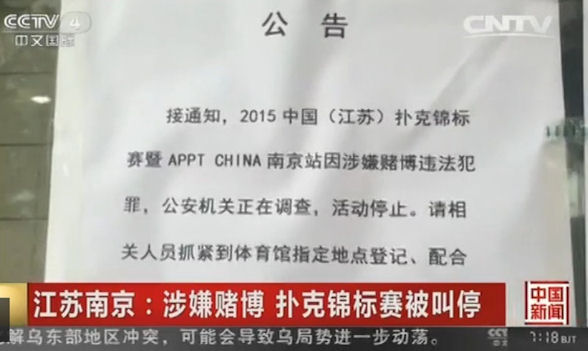
CCTV 4 shows a notice posted at the Jiangsu Wutaishan Sports Centre after Friday’s raid
Sadly, we may never know exactly what potential lies behind China’s curtain. We here at WGM would love nothing more than to see the wonderful game of poker flourish in China. But poker organizers around the world must respect the fact that the People’s Republic of China has a right to create and enforce its own laws – and no amount of clutching at loopholes can change that. One thing is for sure – we certainly won’t be seeing any more tournaments of this nature held in the PRC for a long time to come.

